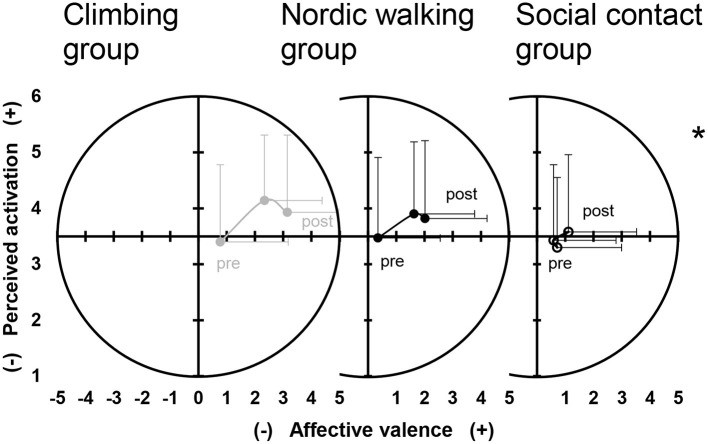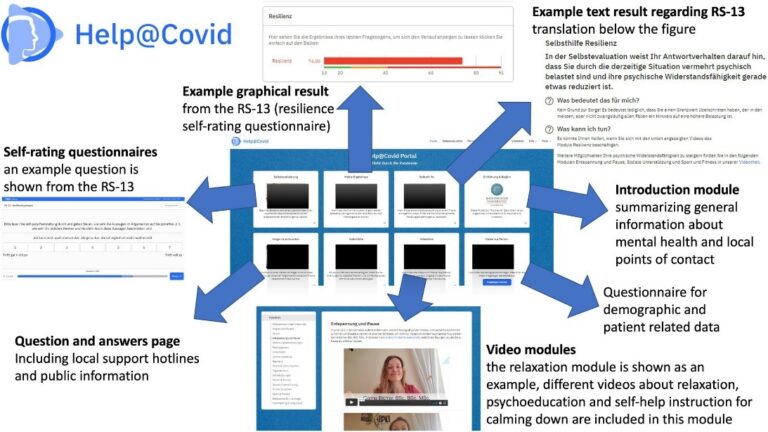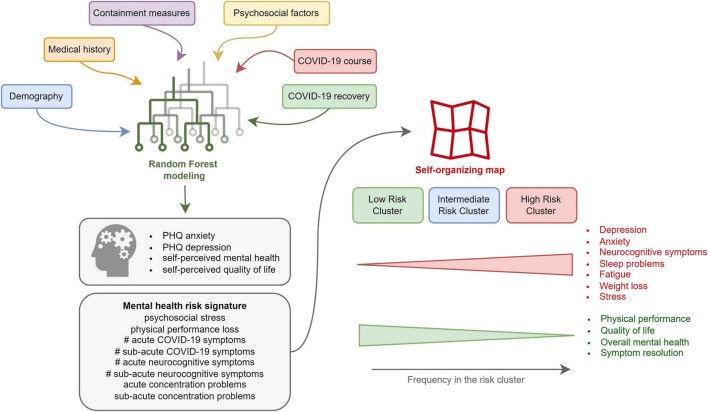
Anichstrasse 35
6020 Innsbruck
Fax: +43 (0)512 504 25267
Email: birgit.wolfsgruber@tirol-kliniken.at
Website: https://psychosomatik.tirol-kliniken.at/
Research year
Research Branch (ÖSTAT Classification)
301403, 301404, 301408, 301905, 302045, 302046, 302065, 302067, 302084, 305908, 305909
Keywords
anxiety disorders, COVID-19, eating disorders, high altitude psychiatry, mental stress, patient reported outcomes, psycho-oncology, psychological aspects of allotransplantation, psychoneuroimmunology, and sports psychiatry
Research Focus
Psychosomatic medicine provides the opportunity for interdisciplinary research at the interface of somatic and psychiatric health and disease. We focus on:
- The psychoneuroimmunological link between mental stress and physical and psychiatric morbidity including post COVID Condition
- Eating disorders
- Sports psychiatry with a focus on high-altitude and alpine environments
- Psychosocial issues and mental health in special fields of medicine
- Patient-reported outcomes
- Students and staff wellbeing
General Facts
The Psychiatry II division covers the field of psychosomatic medicine and serves as a supra-regional treatment facility. It provides diagnostic work-up and multimodal therapy programmes, including cognitive-behavioural and psychodynamic approaches. Evidence-based treatment guidelines and best practice experiences are incorporated into customised treatment plans for patients with anxiety and stress-related disorders, somatic symptom disorders and eating disorders. The clinical service includes in-patient, day-patient and out-patient treatment programmes as well as a psychiatric-psychological consultation/liaison service.
Research in the field of psychosomatic medicine deals with the complex interactions between physical, mental and social conditions that can contribute to psychosomatic and somatopsychic comorbidities. It is characterised by interdisciplinary and transdisciplinary approaches and cooperations. Patient involvement in research gives important impulses to our clinical projects.
Research
Stress and Anxiety-Related Disorders including post COVID
Contact persons: Katharina Hüfner, Barbara Sperner-Unterweger
Mental stress is linked to somatic and psychiatric morbidity, but the neurobiological pathways of these associations are still not fully understood. Mental stress is known to be immunomodulatory, which is one of the basic concepts of psychoneuroimmunology. Together with our research partners at the Medical University of Innsbruck, we investigate the effects of acute and chronic mental stress on bio-physiological changes such as neurotransmitter precursor amino acids (kynurenine, phenylalanine, tyrosine, tryptophan), epigenetic profiles or heart rate variability in healthy subjects as well as individuals with depression, somatic symptom disorder, post-traumatic stress disorder and anxiety disorders.
Our research also focuses on possible psycho-immunological mechanisms linking mental and physical disease. Preliminary data indicate a role for psychoneuroimmunology also in post COVID condition. Within a larger research consortium formed at our Medical University during the COVID-19 pandemic, we have identified mental stress as an important risk factor for impaired mental health following COVID-19 (Fig.1).We also discovered that mental stress and excessive thoughts, feelings and behaviour regarding bodily symptoms correlates strongly with post COVID condition. Individual illness perception seems to play an important role in symptom persistence post COVID, as well. As part of an interdisciplinary research team, we are exploring whether Yoga breathing techniques can ameliorate stress, anxiety and dysfunctional breathing in patients with post COVID condition. During the COVID-19 pandemic we also developed an online intervention platform to provide self-help for individuals with stress related mental symptoms (Fig. 2).
An inter- and transdisciplinary project using public involvement in research approach, together with colleagues from the University of Innsbruck, addresses the question of which factors might be important to bridge the knowledge-action gap in health-related as well as climate friendly behaviour. The factor self-regulation was identified as an important component.
Patient-Reported Outcomes
Contact persons: Bernhard Holzner, Gerhard Rumpold, Johannes Giesinger
In 2021 and 2022 the work of the team focused primarily on the interpretation of patient-reported outcome (PRO) data collected in clinical studies and daily practice, on methodological aspects of cancer clinical trials and on contributing to international guidelines in the field of PRO research.
Our publications comprised an analysis of the impact of blinding on PRO results in cancer clinical trials, normative data for health-related quality of life (HRQOL) in a number of European countries, PROs from clinical studies and the investigation of the impact of the COVID pandemic on HRQOL in the general population. Since 2021, we are part of the SISAQOL-IMI consortium (www.sisaqol-imi.org) that develops international guidelines for the use of PRO measures in cancer clinical trials. Within this project, we are leading the work on graphical presentation of PRO data and on the evaluation of the clinical meaningfulness of PRO differences between treatments.
One further major research focus was on Health-Related Quality of Life (HRQOL) of children with cancer. In close collaboration with the Division of Haematology and Oncology (Department of Paediatrics I) we have conducted several observational studies on the implementation and usefulness of electronic PROs in clinical practice. We have further established an interest group for research on Children, Adolescents and Young Adults with Cancer (CAYAC) within the EORTC Quality of Life Group to investigate methodological difficulties of PRO assessment in paediatric oncology and develop further high-quality research tools. Together with our CAYAC colleagues, we conducted several high-impact reviews and studies on different aspects of PRO in paediatric oncology as well as paediatric oncological rehabilitation. We are leading an international multicentre study on HRQOL in children with cancer. In addition, we are collaborating in an ongoing EU project (Horizon Europe Mission on Cancer-2021) as experts for HRQOL in paediatric oncology.
Furthermore, there are extensive efforts to routinely extend PRO assessments throughout the Medical University / Tyrol Clinics via an electronic patient portal solution. The data thus obtained from the so-called “real world” should offer added value for individual patient treatment on one hand and be usable in the future for research projects and within the framework of quality assurance on the other.
In order to bundle all research efforts in connection with the topic of patient-reported outcomes, a separate research structure, the so-called Health Outcomes Research Unit (HORU), was therefore founded within the University Department of Psychiatry II in 2021.
Eating Disorders
Contact person: Barbara Mangweth-Matzek
It seems that we know a lot about the typical young female patient with an eating disorder, but it has become evident in recent years that eating disorders affect all age cohorts and both genders. Literature on middle aged and older women is growing, and menopause definitely plays a role in the symptomatology. The main focus of our research is still the association of various aspects of menopause and eating behaviour. In addition, we are studying long-term eating disordered patients and are investigating which factors are prognostic for remission or persistence of SEED (severe and enduring eating disorder). In this course, we are also focussing on remitted eating disordered patients and compare them to controls and still eating disordered patients.
Eating disorders in males are always a main emphasis of our research programme, but the small numbers are a challenge. We are also recruiting remitted and still symptomatic patients in order to compare them on various factors.
With regard to morbid obesity, we are working on various concepts to counsel and support obese patients with or without bariatric surgery. These patients require long-term treatment.
Although anorexia and bulimia nervosa have been studied for decades, many main factors are still unknown. We still do not know etiological factors for anorexia and bulimia nervosa, rendering treatment not as efficient as it should be.
Well-being of medical students and physicians
Contact persons: Alexandra Huber, Stefan Höfer
Medical students and hospital physicians often report on high demands, stressors, pressure to perform and lacking resources and are therefore at a higher risk for burnout and mental strain. Preserving and fostering health and well-being is of utmost importance in this regard. Therefore, we investigate since 2015 using annual online surveys both individual factors (e.g. character strengths) as well as situational factors (e.g., study/working conditions) that might play a role for medical students and physicians to experience well-being, thereby entering uncharted scientific territory by combining these constructs. Results from our studies showed that character strengths and well-being correlate positively in cross-sectional as well as longitudinal designs in principle. The applicability of character strengths is an important factor contributing positively to well-being and work engagement. Favourable job characteristics such as autonomy or social support from colleagues foster this applicability and subsequently reduce the risk of burnout. A high degree of socio-moral work climate is responsible for a higher applicability of character strengths, which in turn contributes to a positive upward spiral of a greater level of socio-moral work climate.
During the COVID-19 pandemic, particularly study conditions have changed and the role of factors contributing to students’ health and well-being needed to be reanalysed. Results until now show that well-being before and during the pandemic did not differ significantly. However, levels of study satisfaction, social support and socio-moral work climate were higher during the pandemic. Medical students experienced less emotional exhaustion, organisational stressors and work overload. This stands in contrast with rather high levels of anxiety and depression. These partially unexpected results may be based on response shift biases and are the focus of ongoing analyses.
These results merit the benefit to further educate medical students in health promotion strategies focusing on both individual and situational factors.
Psychosocial Issues and Mental Health in special fields of medicine:
Transplantation psychology
Contact person: Martin Kumnig
Transplantation psychology remains a relatively new field of medicine and transplantation. More recently, as outcomes are reviewed and due to advanced developments in the field, the importance of psychosocial and bioethical considerations has become an increasingly relevant topic. In 2022, the aim of research was to create a foundation of high quality articles that address psychosocial and bioethical challenges and developments in the evolving field of transplantation medicine, particularly in vascularised composite allotransplantation (VCA) with viewpoints driven by research and clinical experience across the different types of transplants.
Psychosocial aspects span the lifecycle of transplantation, so that initial evaluation and assessment of candidates, optimisation of psychosocial variables, support peri-operatively, and preparation and management of post-transplantation changes and adjustment are just some of the areas of research. Psychosocial research also allows the optimisation of potential candidates to ensure adequate support and interventions to expand candidacy (considering risk-benefit issues) and initialise supportive interventions before and after transplantation (e.g., dealing with the graft in daily life, etc.).
In addition to the psychosocial aspects that span the lifecycle of transplantation mentioned herein, bioethical concerns need to be considered as fundamental elements of patient evaluation and follow-up protocols. Specifically, respecting patients’ self-determination (autonomy) is particularly challenging given the limitations of data on long-term psychosocial and clinical outcomes.
Psycho-oncology
Contact person: Bernhard Holzner
With our research activities in the field of psycho-oncology, we aim to improve the understanding of the psychological and emotional aspects of cancer and to develop effective interventions and support services to enhance the quality of life and well-being of cancer patients, survivors and their families.
As the COVID-19 pandemic had an important impact on cancer patients and their families, we carried out research projects in that area.
Sports Psychiatry
Contact person: Katharina Hüfner
Research in “sports psychiatry” at our department focusses on effects of the alpine environment as well as high altitude on mental health, taking the location of Innsbruck in the heart of the Alps into account. Multiple data are available describing somatic symptoms that can occur at high altitude as well as the effect of physical activity in an alpine environment on somatic conditions. On the other hand, only very little evidence is available concerning mental health. In recent years, we have pioneered the investigation of the effect of high altitude exposure on mental health and are now focusing on individuals with pre-existing psychiatric conditions. In our studies, we combine online questionnaire studies with field studies at high altitude (such as the Everest Base Camp) as well as controlled simulated environments (normobaric hypoxia chamber at the University of Innsbruck and the hypobaric hypoxia chamber TerraXcube EURAC research in Bolzano). Our results suggest that a pre-existing psychiatric condition is a risk factor for developing symptoms of acute mountain sickness. We are currently investigating possible causes for this association. We are also interested in the effect of hypoxia on neurocognitive function. In a study in the TerraXcube in cooperation with Eurac Research in Bolzano we discovered that reaction time is most consistently affected at an altitude of 5000 m, yet this impairment is not realised by the affected participants.
While most people do not exercise enough, there is also a possibility to develop features of behavioural addiction in mountaineering. Individuals who show such behavioural addiction to mountaineering show higher levels of stress and higher scorings for anxiety or depression compared to individuals who also go mountaineering but do not display addictive behaviour. Ongoing projects in collaboration with the Österreichische Kuratorium für Alpine Sicherheit and other international partners focus on the prevalence of posttraumatic stress disorder symptoms following accidents in the alpine environment. For patients with posttraumatic stress disorder as well as anxiety disorders, we regularly organise therapeutic climbing groups. These interventions show a good effect on “state anxiety” and improve affective valence (Fig 3). We also evaluate possible underlying biological effects linking these projects to our research focus in epigenetics and psychoneuroimmunology. In an inter- and transdisciplinary project that takes a collaborative research approach including public involvement, we are working with partners from University of Innsbruck to investigate factors to strengthen the resilience in people living in an alpine environment. This participatory approach provides a link to the HORU´s research projects.
In order to support our internationally recognised research focus on alpine and high altitude psychiatry, a chair in Sports Psychiatry was installed at the Division of Psychiatry II in 2023 by Innsbruck Medical University.
Pictures
Selected Publications
Hüfner K, Tymoszuk P, Sahanic S, Luger A, Boehm A, Pizzini A, Schwabl C, Koppelstätter S, Kurz K, Asshoff M, Mosheimer-Feistritzer B, Pfeifer B, Rass V, Schroll A, Iglseder S, Egger A, Wöll E, Weiss G, Helbok R, Widmann G, Sonnweber T, Tancevski I, Sperner-Unterweger B, Löffler-Ragg J. Persistent somatic symptoms are key to individual illness perception at one year after COVID-19 in a cross-sectional analysis of a prospective cohort study . J Psychosom Res. 2023: Mar 17: 169:111234. doi: 10.1016/j.jpsychores.2023.111234.
Habelt L, Kemmler G, Defrancesco M, Spanier B, Henningsen P, Halle M, Sperner-Unterweger B, Hüfner K. Why do we climb mountains? An exploration of features of behavioural addiction in mountaineering and the association with stress-related psychiatric disorders. Eur Arch Psychiatry Clin Neurosci. 2022: Aug 18: doi:
Bichler CS, Niedermeier M, Hüfner K, Gálffy M, Sperner-Unterweger B, Kopp M. Affective Responses to Both Climbing and Nordic Walking Exercise Are Associated With Intermediate-Term Increases in Physical Activity in Patients With Anxiety and Posttraumatic Stress Disorder – A Randomized Longitudinal Controlled Clinical Pilot Trial. Front Psychiatry. 2022: Jun 9:13: 856730. doi: 10.3389/fpsyt.2022.856730. PMID: 35757205; PMCID: PMC9218791.
Hüfner K, Giesinger JM, Gostner JM, Egeter J, Koudouovoh-Tripp P, Vill T, Fuchs D, Sperner-Unterweger B. Neurotransmitter Precursor Amino Acid Ratios Show Differential, Inverse Correlations with Depression Severity in the Low and High Depression Score Range. Int J Tryptophan Res. 2021: Sep 1;14: 11786469211039220. doi: 10.1177/11786469211039220. PMID: 34483668; PMCID: PMC8414612.
Hüfner K, Caramazza F, Stawinoga AE, Pircher Nöckler ER, Fusar-Poli P, Bhandari SS, Basnyat B, Brodmann Maeder M, Strapazzon G, Tomazin I, Sperner- Unterweger B, Brugger H. Assessment of Psychotic Symptoms in Individuals Exposed to Very High or Extreme Altitude: A Field Study. High Alt Med Biol. 2021: Dec: 22(4):369-378. doi: 10.1089/ham.2020.0210. Epub 2021 Jul 29. PMID: 34324390; PMCID: PMC8742264.
Pilz MJ, Nolte S, Liegl G, King M, Norman R, McTaggart-Cowan H, Bottomley A, Rose M, Kemmler G, Holzner B, Gamper EM; The European Organisation for Research and Treatment of Cancer Quality of Life Utility-Core 10 Dimensions: Development and Investigation of General Population Utility Norms for Canada, France, Germany, Italy, Poland, and the United Kingdom. EORTC Quality of Life Group.Value Health. 2022: Dec 23: S1098-3015(22)04783-0. doi: 10.1016/j.jval.2022.12.009. Online ahead of print.PMID: 36572102
Giesinger JM, Efficace F, Aaronson N, Calvert M, Kyte D, Cottone F, Cella D, Gamper EM. Past and Current Practice of Patient-Reported Outcome Measurement in Randomized Cancer Clinical Trials: A Systematic Review. Value Health. 2021: Apr;24(4): 585-591. doi: 10.1016/j.jval.2020.11.004. Epub 2021 Feb 10.PMID: 33840437
Riedl, D., Rothmund, M., Darlington, A. S., Sodergren, S., Crazzolara, R., de Rojas, T., & EORTC Quality of Life Group (2021). Rare use of patient-reported outcomes in childhood cancer clinical trials – a systematic review of clinical trial registries. European journal of cancer. Oxford, England: 1990: 152, 90–99.
Sztankay M, Wintner LM, Roggendorf S, Nordhausen T, Dirven L, Taphoorn MJB, Verdonck-de Leeuw IM, Velikova G, Bottomley A, Kulis D, Kachel T, Schmidt H; EORTC Quality of Life Group. Developing an e-learning course on the use of PRO measures in oncological practice: health care professionals’ preferences for learning content and methods. Support Care Cancer. 2022: Mar;30(3): 2555-2567. doi: 10.1007/s00520-021-06676-x. Epub 2021 Nov 19.
Wintner, L. M., Sztankay, M., Riedl, D., Rumpold, G., Nickels, A., Licht, T., & Holzner, B. How to implement routine electronic patient-reported outcome monitoring in oncology rehabilitation. International journal of clinical practice. 2021: 75(4): e13694
Mangweth-Matzek B, Decker B, Erschbaumer I, Wurnig V, Kemmler G, Bichler CS, Rupp CI: Disordered eating symptoms in Austrian men of different ages in the context of fitness centers. Eat Weight Disord. 2022: Jun;27(5): 1765-1773. doi: 10.1007/s40519-021-01317-y.
Mangweth-Matzek B, Rupp CI, Vedova S, Dunst V, Hennecke P, Daniaux M, Pope HG: Disorders of eating and body image during the menopausal transition: associations with menopausal stage and with menopausal symptomatology. Eat Weight Disord. 2021: Dec;26(8): 2763-2769. doi: 10.1007/s40519-021-01141-4.
Huber A, Bair A, Strecker C, Höge T, Höfer S: Do more of what makes you happy? The applicability of signature character strengths and future physicians’ well-being and health over time. Frontiers in Psychology 2021: DOI: 10.3389/fpsyg.2021.534983
Kachel T, Huber A, Strecker C, Höge T, Höfer S: Reality meets belief: A mixed methods study on character strengths and well-being of hospital physicians. Frontiers in Psychology 2021: DOI: 10.3389/fpsyg.2021.547773
Exenberger S, Kumnig M, Huber A, Prodinger W, Siller H, Medicus E, et al.: Kommunikative und soziale Kompetenzen im Medizincurriculum der Medizinischen Universität Innsbruck: Lernziele, Inhalt und Didaktik [Communicative and social competence in the medical curriculum of the Medical University of Innsbruck: learning objectives, content, and teaching methods]. GMS Journal of Medical Education 2021: 38(3): Doc59. DOI: 10.3205/zma001455
Höfer S: Quality of Life. In W. Ruch, A. Bakker, L. Tay, & F. Gander (Eds.), Handbook of Positive Psychology Assessment. European Association of Psychological Assessment. 2021
Haller E, Lubenko J, Presti G, Squatrito V, Constantinou M, Nicolaou C, Papacostas S, Aydın G, Chong YY, Chien WT, Cheng HY, Ruiz FJ, García-Martín MB, Obando-Posada DP, Segura-Vargas MA, Vasiliou VS, McHugh L, Höfer S, Baban A, Dias Neto D, da Silva AN, Monestès JL, Alvarez-Galvez J, Paez-Blarrina M, Montesinos F, Valdivia-Salas S, Ori D, Kleszcz B, Lappalainen R, Ivanović I, Gosar D, Dionne F, Merwin RM, Karekla M, Kassianos AP, Gloster AT. To Help or Not to Help? Prosocial Behavior, Its Association With Well-Being, and Predictors of Prosocial Behavior During the Coronavirus Disease Pandemic. Front Psychol. 2022: Feb 11;12: 775032. doi: 10.3389/fpsyg.2021.775032
Kumnig M, Järvholm S: Vascularized composite allotransplantation: emerging psychosocial issues in hand, face, and uterine transplant. Curr Opin Organ Transplant. 2022: Dec 1;27(6): 501-507. doi: 10.1097/MOT.0000000000001028.
Kumnig M, Jowsey-Gregoire SG, Bellew M, Dean W, Järvholm S, Coffman K, Brown C, Moreno E, Talbot SG, Morelon E, Petruzzo P, Amer H. The Chauvet Workgroup: A Resource for the Psychosocial Aspects of Reconstructive Transplantation. Mayo Clin Proc. 2022: Jun;97(6): 1050-1053. doi: 10.1016/j.mayocp.2022.02.003.
Kumnig M, Jowsey-Gregoire SG, Gordon EJ, Werner-Felmayer G. Psychosocial and bioethical challenges and developments for the future of vascularized composite allotransplantation: A scoping review and viewpoint of recent developments and clinical experiences in the field of vascularized composite allotransplantation. Front Psychol. 2022: Dec 15;13: 1045144. doi: 10.3389/fpsyg.2022.1045144.
Koehler M, Hoppe S, Kropf S, Lux A, Bartsch R, Holzner B, Krauter J, Florschütz A, Jentsch-Ullrich K, Frommer J, Flechtner HH, Fischer T. Randomized Trial of a Supportive Psychotherapy for Parents of Adolescents and Young Adults With Hematologic Malignancies. J Natl Compr Canc Netw. 2022: Apr 11;20(13): doi: 10.6004/jnccn.2021.7075.
Koinig KA, Arnold C, Lehmann J, Giesinger J, Köck S, Willenbacher W, Weger R, Holzner B, Ganswindt U, Wolf D, Stauder R. The cancer patient’s perspective of COVID-19-induced distress-A cross-sectional study and a longitudinal comparison of HRQOL assessed before and during the pandemic. Cancer Med. 2021: Jun;10(12): 3928-3937. doi: 10.1002/cam4.3950. Epub 2021 May 10. PMID: 33973411
Selection of Funding
Help@COVID – Psychiatrische Prävention, Früherkennung und Therapiebegleitung. AWS – Austria Wirtschaftsservice Gesellschaft mbH (AUT), IÖP Toolbox Call 2021: Katharina Hüfner, Matyas Galffy (2021-2022)
KIDZ PAZ-NOWn – Increasing resilience among young people and Communities in Paznaun Valley via an inter- und transdisciplinary research education collaboration Linking Hydroclimatology, behavioural Medicine and Education for sustainable development. Österreichische Akademie der Wissenschaften (ÖAW AUT) ÖAW Call: Earth Systems Sciences: Katharina Hüfner (2022 ongoing)
Development of an EORTC questionnaire for Children with Cancer (8-14 years) – Phase I & II” (EORTC QLG: 002-2020): PI David Riedl (2020-2023)
EUonQOL – Quality of Life in oncology: measuring what matters for cancer patients and survivors in Europe: Holzner, Riedl (2022-2024)
Development of an interpretation guideline for the EORTC PRO measures: Sztankay (2021-2024)
Update of the Reference Value Manual and Database: Sztankay (2021-2024)
Development of an EORTC questionnaire for individuals at risk for a Hereditary Cancer Predisposition Syndrome: Oberguggenberger (2022-2024)
Post-traumatic stress disorder (PTSD) in mountain accident survivors – a cross-sectional questionnaire study. Deutsche Gesellschaft für Berg- und Expeditionsmedizin e.V. (BExMED): Katharina Hüfner (2021-2022)
Collaborations
Ansgar Weltermann, Tumorzentrum Oberösterreich, Austria
Hermann Brugger, Eurac Research, Bolzano, Italy
Elisabeth Weiss, LFU Innsbruck, Austria
Harrison G. Pope, MD, Biological Psychiatry Laboratory, McLean Hospital, Harvard Medical School, Belmont, Massachusetts, USA
M. Giesinger, Kantonsspital St. Gallen (Dept. of Orthopedia), St. Gallen, Schweiz
Andrew Bottomley, EORTC, Brussels, Belgium
Josef Thaler, Department for Internal Medicine, Klinikum Wels-Grieskirchen
August Zabernigg, Department for Internal Medicine, County Hospital Kufstein
Fabio Efficace, GIMEMA Group, Roma, Italy
Heike Schmidt, Department of Radiotherapy, Medical University of Halle


